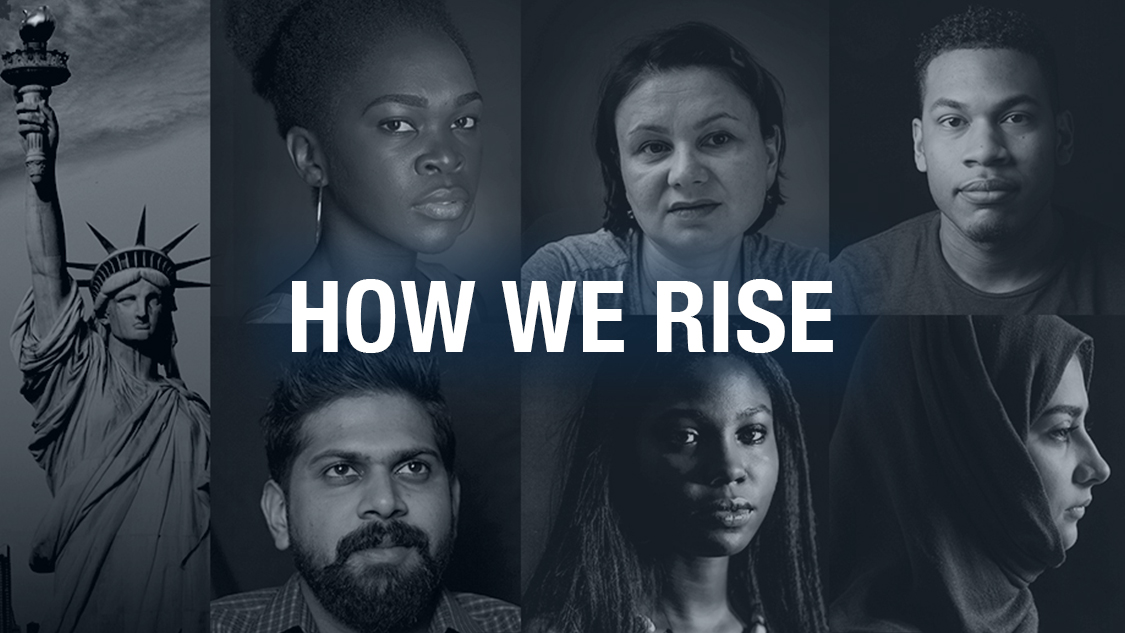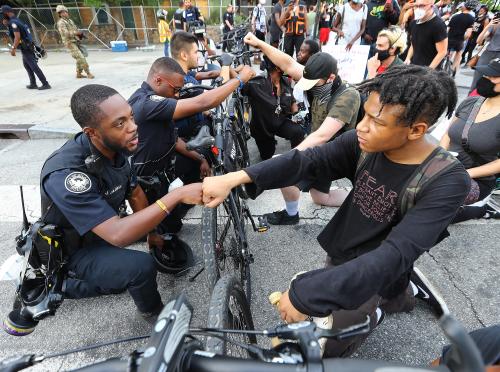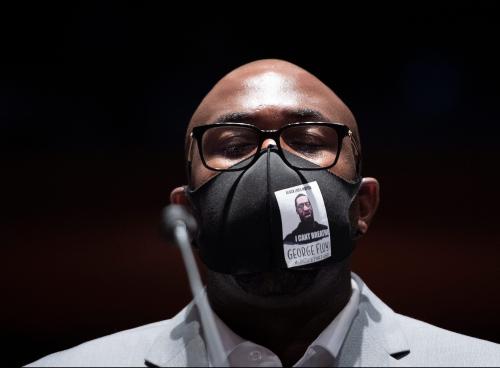May 25th marked the one-year date of George Floyd’s murder. I refuse to call it an anniversary as that sounds celebratory. Though many were relieved that Derek Chauvin was convicted of murder, it is impossible to celebrate the killing of a person who died under the knee of a police officer while three other officers stood guard, ignoring the pleas of several concerned bystanders. And yet, it took this shocking public display of police violence to get the attention of most Americans.
After all, the Chauvin case was a slam dunk. If any police officer should have been convicted of murder, it was this one. Still, many of us waited on the jury’s decision as if the TV was a scoreboard. We held our breath as we watched, waiting to see if the points would count after the ball swished through the net. This pause, hesitation, and worry is because we know the pervasive ways that systemic racism operates, especially in the criminal justice system and particularly when the victim is Black. Incidents like this happen seemingly every day in America.
Over 60 people were killed by police during the length of the Chauvin trial. On the same day as opening statements, 13-year-old Adam Toledo was killed by police during a foot chase. Before Toledo was killed, video evidence seems to show him dropping something out of his hands before turning around with his hands up. During the trial, Daunte Wright was killed during a traffic stop by Kim Potter who was on the police force longer than he was alive. The 26-year veteran allegedly confused her gun for a taser during a traffic stop. This killing occurred down the street from where Floyd was murdered. Coinciding with the reading of the guilty verdict, a 16-year-old in Columbus, Ohio named Ma’Khia Bryant was killed after calling the police for protection from an alleged attack. She had a knife at the time she was killed, but people question how quickly the officer shot Bryant as well as whether the outcome would have been the same if Bryant and the other girls were white. The day after the Chauvin trial, Andrew Brown, Jr. was killed by police in North Carolina. Police say Brown was using his car as a “deadly weapon,” but body-camera videos show that the police shot Brown as he was driving away from the officers, not at them.
While some people consider the guilty verdict a final form of accountability and want to move on, others are not so quick to forgive and forget. These stories and the collective memories of past victims who never received justice continue to manifest in our daily lives and in our social media newsfeeds. Accordingly, people have become woke to the idea that the over individualization of courts do little to address the systemic ways that racism operates in policing and the criminal justice system.
America remains a deeply racist country and until we recognize and deal with that fact, even important convictions like the Chauvin case will not alter the status quo in a meaningful way.
To make real progress and create systemic change, we need comprehensive police reform at the federal, state, and local level. Anything short of that will not ease the pain and suffering that takes place regularly in the United States.
Federal Reforms
One year ago, there was hope the Floyd murder would galvanize the country and lead to immediate and forceful action. In June 2020, Donald Trump signed an Executive Order (EO) to create a federal database of decertified and terminated police officers. The EO made a series of additional provisions to incentivize law enforcement to ban chokeholds and increase de-escalation. During his inauguration speech, Joe Biden’s admonished systemic racism, and in his first address to Congress, he called for the passage of police reform by the one-year mark of George Floyd’s murder. Well, this date has come and gone.
To its credit, the House of Representatives has passed the George Floyd Justice in Policing Act—twice. The legislation includes a series of important reforms that Democrats and Republicans agree upon, including: providing mental health training and assistance for officers; collecting use of force data; providing de-escalation training; certifying officers and training courses at the federal level; mandating body-worn cameras; creating a data base of bad apples; banning chokeholds and no-knock warrants; and creating a federal anti-lynching bill.
The legislation also aims to repeal qualified immunity, which is the main sticking point for Republicans. Qualified immunity is the court doctrine that prevents police officers and other government officials of being held financially culpable. Consequently, financially liability falls primary on taxpayers. A majority of Americans, including over 40% of Republicans, believe restructuring qualified immunity will make a difference.
The Senate has not acted, but lawmakers on both sides say that a bipartisan bill is imminent. Though I remain cautiously optimistic that leaders like Representative Karen Bass and Senators Cory Booker and Tim Scott can work together to get this done, many Americans remain suspicious of empty sound bites. Will the policies needed to address systemic racism be watered down? Will police reform just become a gesture to ease white people’s consciences, but not address real problems?
My research working with law enforcement and studying policing over the past decade suggests that without restructuring qualified immunity, the low hanging fruit that is already agreed upon by Democrats and Republicans will do little to alter the rotten tree that bad apples grow from.
Department of Justice consent decrees to formally restructure police departments are also key steps for moving forward. Consent decrees are not solely about police use of force. They are also about racial discrimination in hiring, promotion, and discipline within police departments among officers. In recent months, Attorney General Merrick Garland has initiated federal investigations into Minneapolis and Louisville police departments. Louisville is where Breonna Taylor was killed in her home. While previous Democratic and Republican presidents issued consent decrees in their Departments of Justice, the Trump administration’s Department of Justice did not use consent decrees. Biden’s Department of Justice has much work to do to make up for lost time.
State Reforms
Many states have been quite active regarding police reform. Roughly 30 states have made a change to police tactics, mostly involving neck restraints and duty to intervene. However, these reforms may do little to change things without protecting officers who intervene and blow the whistle on bad behavior by creating a state and/or federal independent body to protect them.
I highlight two reforms that I think will make a monumental impact. First, some states including Colorado, New Mexico, and Connecticut have repealed qualified immunity. Colorado is making officers assume some financial liability for misconduct up to $25,000. I believe shifting to insurances for departments and officers can make huge inroads to holding accountable corrupt departments and officers who engage in misconduct.
Second, the state of Maryland repealed the Law Enforcement Bill of Rights (LEBOR). LEBOR makes it difficult to investigate police officers by giving them more time to respond to make official statements and even having the ability to keep their jobs if convicted of a felony. Critics of LEBOR say the legislation allows bad apple officer to proliferate. The Maryland state legislature agreed.
Local Reforms
At the local level, cities and counties have initiated task forces to review police practices. Many cities are now requiring de-escalation training and the implementation of a use of force continuum. While a series of recommendations have been mandated, local residents are waiting for these recommendations to be implemented. Some areas, such as Prince George’s County, are still waiting on the entire police department to have body-worn cameras. New York City banned qualified immunity. Other cities from Los Angeles to Baltimore have reallocated funds to consolidate resources and better streamline mental health services.
Denver has reallocated mental health calls for service to mental health specialists and paramedics. It’s Support Team Assisted Response program, known as STAR, is a prototype. In responding to over 700 calls for service in the first six months, the STAR program yielded zero arrests and zero killings. Cities like Oakland are aiming to do something similar. Given how much of Oakland’s budget is allocated to law enforcement (over 40%), reallocating calls for service to other professionals with a better skillset to address low-level, nonviolent incidents is warranted.
Bridging the gaps
Collectively, these reforms are promising. However, when it comes to the criminal justice system, policing is just the tip of the iceberg that needs transforming. From traffic stops and cash bail to prison culture and work opportunities after incarceration, it is clear the criminal justice pipeline is laced with racial inequalities. Reimagining and rebuilding the ecosystem, structure, and culture of law enforcement is the only way forward.
I partnered with Brent Orrell, a senior fellow at the American Enterprise Institute, to establish the Brookings-AEI working group on criminal justice reform—a group of scholars, practitioners, and policy experts working together on bi-partisan reform solutions to foster safer, more peaceful, and more resilient communities. In our first report, we laid out short-, medium-, and long-term reforms that can address disparities in the criminal system.
On the one year date of the Floyd murder, we sit on the cusp of a moment that will move either in the direction of transformative change or a watered-down and sanitized version that does not move the needle on police accountability and racial justice. The time for meaningful action is now.
The Brookings Institution is committed to quality, independence, and impact.
We are supported by a diverse array of funders. In line with our values and policies, each Brookings publication represents the sole views of its author(s).








Commentary
One year after George Floyd’s murder, what is the status of police reform in the United States?
May 25, 2021